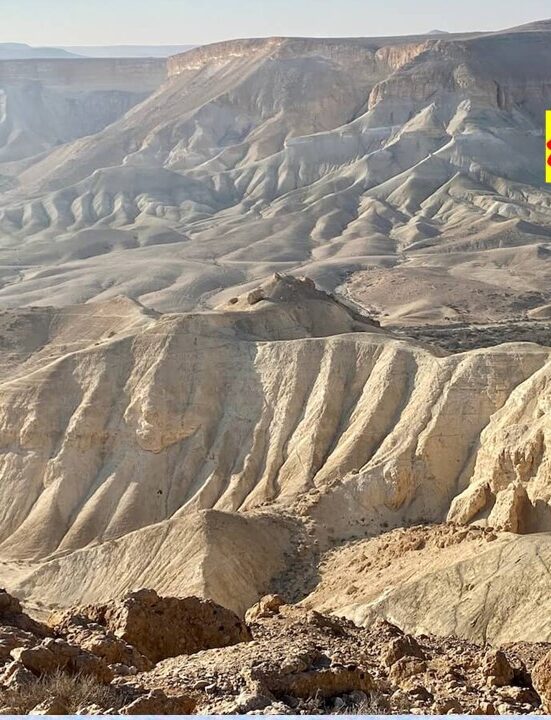17 Lectures
-
Negev – lecture 1
A preliminary analysis of the “Negev” in the Torah.Where exactly is the Negev? And what does the word “Negev” mean in Hebrew?And why, of all places, does Avraham decide to go to the Negev when he first arrives in land of Israel?
-
Negev – lecture 2
What are the borders of the Negev according to the Torah? Why is the south sometimes called “Negev”, sometimes “Tayman” (Yemen) and sometimes “Yamin” (right, in English)? How does this relate to the name Jacob gave his son – “Binyamin” (son of “yamin”)? We will suggest some answers to the question that we have not yet solved – why does Avraham go, again and again, to the Negev?
-
Negev – lecture 3
On Purim we celebrate the victory over Amalek, and Amalek – according to the Bible – lives in the Negev. It all starts with the ancient ancestors of Israel and Amalek – Isaac and his son – Esau. It is written about both Isaac and Esau, that they were “people of the field”, and both lived in the Negev. That explains why Isaac loved Esau, but what does it teach us about the essence of the Negev? How does the Negev produce a man like Isaac on the one hand, and Esau and Amalek – on the other?
-
Negev – lecture 4
We saw that both Isaac and Esau were called “men of the field.” Today we will focus on the great difference between them. We will examine the many references in the Torah to Avraham in the Negev and ask – why did Avraham go to the Negev? And why is it important for the Torah to mention this? We will look at different interpretations of the uniqueness of the Negev and focus on Rabbi Hirsch’s interpretation that the Negev is special for solitude and spirituality. We will conclude with the question – whether solitude is always a good thing?
-
Negev – lecture 5
In this lecture we delve into the character of Isaac, “man of the Negev,”. It seems that Isaac is described as a copy of Avraham. Digging and naming the same wells, his similar encounter with the King of Grar, his desire to descend to Egypt. Even in the story of the Akedah – Isaac is passive and simply follows his father’s path. But it is really more complex: after the Akedah, Isaac chooses his own path and goes to the Negev. But eventually and with Divine guidance, he returns to the path of Avraham. Let’s follow his unique path!
-
Negev – lecture 6
Negev and Yom Ha-Atzmaut! In honor of Yom Ha-Atzmaut, we will analyze the Psalm (שיר המעלות) – “When God restored Zion, we were like dreamers… God restored our captivity like the streams in the Negev.” What does the image mean? We will see a video that illustrates this! Is this a praise for an event that has already happened? Or a prayer for the future? We will compare the return to Zion in the days of the Second Temple, and the return to Zion in our days. In both cases we ask that it be like “Streams in the Negev”
-
Negev – lecture 7
So what does the Negev mean to us? We will examine this through the next Negev story – the story of the spies, in which Moshe commands: “Go up into the Negev and see the mountain.” What did David Ben-Gurion think of this verse? And what are the 2260(!) commentaries on this verse, according to the Vilna Gaon? We will examine the story of the spies and ask: Why did Moshe command them to begin in the Negev? Why is it important for the Torah to specify such technical instructions? maybe these are not just technical instructions…
-
Negev – lecture 8
Three beautiful explanations for Moshe’s command to the spies – “Go up to the Negev”. The first is based on the Gemara, which says that the goal was to follow in the footsteps of Avraham. Can we follow in Avraham’s footsteps today? The second – the goal was to tour – to see the beauty and not to be afraid of the difficulties in the Negev. And the third – to teach them that even if there are difficulties and flaws in the land, if they keep the way of God, everything will turn out positively. And this too -…
-
Negev – lecture 9
After all the explanations we saw for Moshe’s instruction – “Go up to the Negev”, we understand that the Negev is a place of preparation, progress and dealing with difficulties towards reaching a goal. I will share my family’s story of immigrating, which also began in the Negev! The next stage in the “Book of the Negev” is a strange story, mentioned twice in the Torah at length, about the Canaanite king of Arad, who came to fight Israel. Why is this story so important? and why does the Torah repeat that he lives in the Negev? To be continued…
-
Negev – lecture 10
We will examine maps of the Negev and ask – why didn’t the Israelites go through the Negev, but instead took a detour through Edom? And why is the story of the King of Arad so important? The Torah teaches us that the Israelites not only followed the path of the spies, but also followed their ideological path. Therefore, the King of Arad understood that they were vulnerable! This is the message of the story!
-
Negev – lecture 11
We will delve deeper into the question from the previous lecture – why did the Israelites move south from “Kadesh” towards Eilat and not north – into the land of Canaan? According to the maps, this doesn’t make sense, and according to the Torah, it doesn’t make sense: They had already defeated the king of Arad and the Amalekites who live in the Negev and they are already a new generation that is not afraid of war – so why not go north and enter the land?
-
Negev – lecture 12
In this lecture, we will answer all the questions we asked about the story of the King of Arad. The connection between the death of Aaron, the war against the King of Arad, and the surprising and tragic journey of the Israelites south. Tragic, because the Israelites adopt “the way of the spies” – they do not have enough confidence and faith to meet the great challenge of the Negev!
-
Negev – lecture 13
In this lecture, we will analyze another story related to the Negev – the story of the wedding of Achsa, the daughter of Caleb, to Othniel, who would become the first judge of Israel. Caleb promises his daughter to whoever conquers “Kiryat Sefer”. Why? The daughter – Achsa – theatrically falls off the donkey and incites her husband to ask her father for a blessing? A strange story! And she needs a blessing, because she received the land of the Negev from her father. What is the meaning of the Negev in this story??
-
Negev – lecture 14
The land of the Negev you have given me, Achsa said to her father. We see 2 interesting interpretations: one – she means her husband – Othniel! called “Negev” – because he has only Torah! And does not worry about earning a living. And the second: she means herself! She has become like the Negev, because of her husband who has only Torah! Two interpretations that require understanding. And also – a new direction: the entire story is parallel to the story of Rebecca’s meeting with Isaac. Rebecca who also falls off the camel and meets Isaac – a man…

